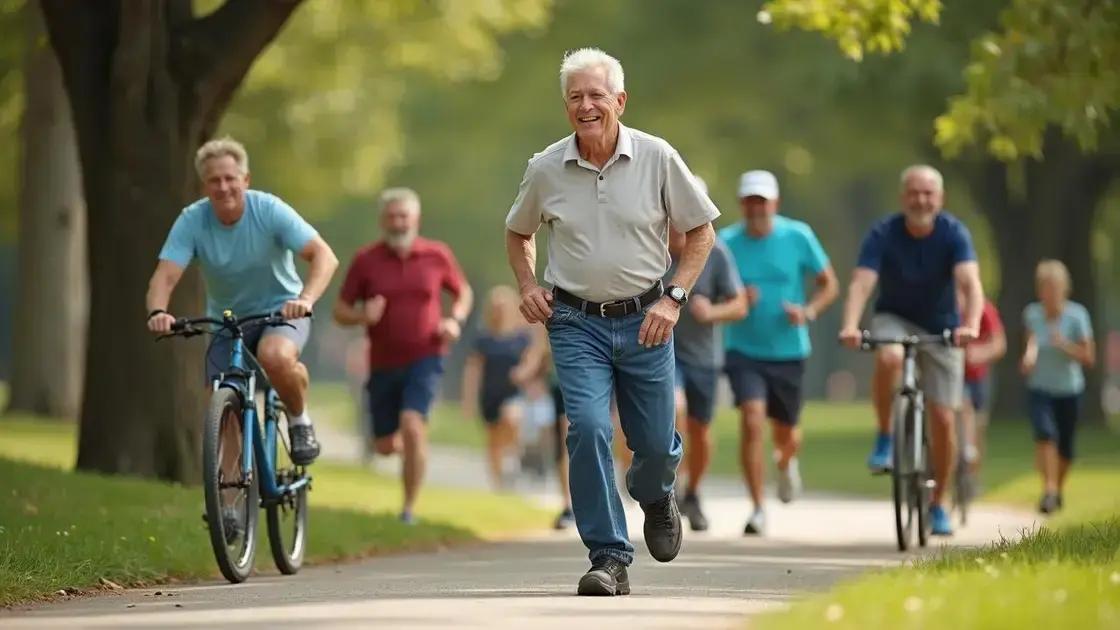To reduce the risk of certain cancers in men over 50, important strategies include maintaining a balanced diet rich in fruits, vegetables, and whole grains, practicing regular physical activity, avoiding tobacco, limiting alcohol, and scheduling regular health screenings for early detection.
Men over 50 face increased cancer risks, but taking proactive steps can significantly reduce these dangers. By making informed lifestyle choices and scheduling regular health screenings, men can effectively lower their chances of developing certain cancers. In this article, we will explore the cancer risks specific to older men, essential lifestyle changes, the importance of health screenings, and dietary recommendations that contribute to cancer risk reduction.
Understanding Cancer Risks for Men Over 50

Understanding cancer risks is crucial for men over 50, as this age group is statistically more susceptible to various types of cancers. Age is a significant factor; the likelihood of developing cancer increases with age due to cumulative exposure to risk factors and the body’s natural changes over time.
Common Cancers in Men Over 50
Men in this age range commonly face risks for certain cancers, including prostate cancer, colon cancer, and lung cancer. Prostate cancer is particularly prevalent, affecting many men in their 60s and 70s. Colon cancer risk also increases, emphasizing the need for regular screenings as part of a preventive healthcare strategy.
Risk Factors
Several risk factors contribute to the likelihood of cancer. These include:
- Genetics: A family history of cancer can elevate risk.
- Lifestyle Choices: Smoking, alcohol consumption, and obesity can increase cancer risk.
- Environmental Factors: Exposure to certain chemicals or hazardous materials may contribute to developing cancer.
Importance of Awareness
Awareness about these risks allows men to take proactive steps towards reducing their chances of developing cancer. Regular check-ups and discussions with healthcare providers can help identify personal risk levels and necessary actions.
Lifestyle Changes to Lower Cancer Risk

Making lifestyle changes is one of the most effective ways for men over 50 to lower their cancer risk. Simple adjustments can create significant benefits for overall health and well-being.
Regular Exercise
Engaging in regular physical activity helps maintain a healthy weight and reduces the risk of cancer. Aim for at least 30 minutes of exercise most days of the week. Activities like walking, swimming, or biking are excellent choices. Strength training twice a week can also enhance muscle health and metabolism.
Quit Smoking
Smoking is a leading cause of cancer. Quitting smoking greatly reduces the risk of lung cancer and many other cancers. Seek support from friends, family, or smoking cessation programs to help with this challenge.
Limit Alcohol Consumption
Excessive alcohol intake is linked to several types of cancer, including breast and liver cancer. Limit alcohol to no more than two drinks per day for men. Consider not drinking at all to further reduce risk.
Maintain a Healthy Weight
A healthy weight lowers cancer risk. Achieving this involves a combination of balanced nutrition and regular physical activity. Focus on gradual weight loss through sustainable lifestyle modifications.
Sleep Well
Getting enough quality sleep is vital for health. Aim for at least 7-8 hours of sleep each night to strengthen the immune system and support overall health.
Importance of Regular Health Screenings

Regular health screenings are vital for men over 50 to detect potential health issues early, particularly cancer. These screenings help find cancers such as prostate and colon cancer at stages when treatment is more effective.
Why Screenings Matter
Many cancers do not show symptoms until they are advanced. Screening allows for early detection, which can lead to better outcomes. For example, routine screenings for prostate cancer can help identify it early, enabling timely intervention.
Recommended Screenings
Men over 50 should discuss the following screenings with their doctors:
- Prostate-Specific Antigen (PSA) Test: Helps screen for prostate cancer.
- Colonoscopy: Recommended every 10 years to check for colon cancer or polyps.
- Lung Cancer Screening: Recommended for smokers or former smokers.
Timing and Frequency
The timing and frequency of screenings can vary based on individual risk factors. Regular check-ups with a healthcare provider can help create a personalized screening schedule.
Discuss Concerns
It’s important to communicate any health concerns with a doctor. They can provide guidance on necessary screenings based on personal and family health history. This proactive approach can significantly decrease cancer risk.
Dietary Tips to Reduce Cancer Risk

Eating a balanced diet is one of the best ways for men over 50 to lower their cancer risk. Certain foods can help support the immune system and promote overall health.
Fruits and Vegetables
Incorporating a variety of fruits and vegetables into your meals is crucial. Aim for at least five servings a day. These foods are packed with essential vitamins, minerals, and antioxidants that help protect against cancer.
Whole Grains
Choose whole grains over refined grains. Foods such as brown rice, whole wheat bread, and oats provide fiber and nutrients that support digestive health. Fiber plays a key role in reducing the risk of colorectal cancer.
Healthy Fats
Include healthy fats in your diet, like those found in avocados, nuts, and olive oil. These fats are beneficial for heart health and help reduce inflammation in the body.
Lean Proteins
Opt for lean proteins such as chicken, turkey, fish, and plant-based sources like beans and lentils. Limit red and processed meats, as studies link these to higher cancer risks.
Limit Sugars and Processed Foods
Reducing sugar and processed foods can help maintain a healthy weight and lower cancer risk. Focus on whole, unprocessed foods as much as possible. Read food labels to avoid hidden sugars and unhealthy additives.
In Summary: Empowering Your Health
Reducing the risk of certain cancers in men over 50 involves a proactive approach that includes lifestyle changes, regular health screenings, and dietary adjustments. By embracing regular exercise and adopting healthy eating habits, you can significantly improve your overall health and potentially lower the risk of cancer.
Furthermore, understanding the importance of regular health screenings enables early detection of health issues, leading to better outcomes. Combining these strategies not only empowers you to take charge of your health but also promotes a higher quality of life.
Ultimately, making informed choices today lays the foundation for a healthier tomorrow.
FAQ – Frequently Asked Questions about Reducing Cancer Risk in Men Over 50
What dietary changes can help reduce cancer risk?
Incorporating more fruits, vegetables, whole grains, and lean proteins, while limiting processed foods and sugars, can help lower cancer risk.
Why are regular health screenings important?
Regular health screenings help detect potential issues early, increasing the chances of successful treatment for conditions like cancer.
How often should men over 50 get screened for cancer?
Men over 50 should discuss screening timelines with their healthcare provider, typically involving prostate exams and colonoscopies every 10 years.
What lifestyle changes can lower cancer risk?
Regular exercise, quitting smoking, maintaining a healthy weight, and limiting alcohol consumption are all important lifestyle changes.
How does physical activity impact cancer risk?
Regular physical activity helps maintain a healthy weight and boosts the immune system, thereby reducing the risk of various cancers.
Can stress affect cancer risk?
While stress alone does not cause cancer, chronic stress can weaken the immune system and contribute to unhealthy lifestyle choices.













